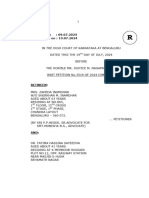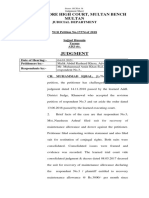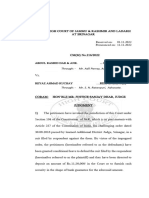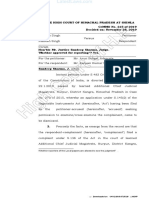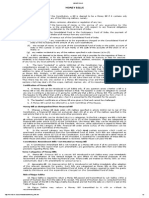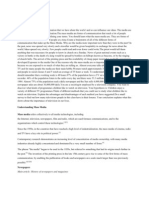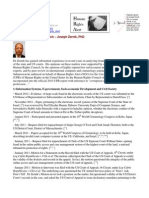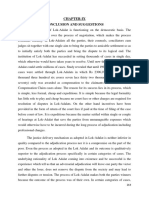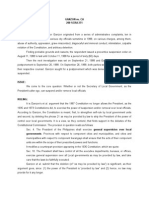CMP Mo 1772007
CMP Mo 1772007
Uploaded by
ArjitCopyright:
Available Formats
CMP Mo 1772007
CMP Mo 1772007
Uploaded by
ArjitOriginal Description:
Original Title
Copyright
Available Formats
Share this document
Did you find this document useful?
Is this content inappropriate?
Copyright:
Available Formats
CMP Mo 1772007
CMP Mo 1772007
Uploaded by
ArjitCopyright:
Available Formats
IN THE HIGH COURT OF HIMACHAL PRADESH
SHIMLA
.
.P
CMPMO No.177 of 2007
Judgment reserved on: 24.6.2008
H
Date of Decision: August 21, 2008
________________________________________________________________
of
M/s AAR KAY Traders Petitioner
rt Versus
M/s Satish Electronics. Respondent.
ou
________________________________________________________________
Coram:
C
The Honble Mr. Justice Deepak Gupta, Judge.
Whether approved for reporting? Yes.
h
For the Petitioner : Mr. Vikas Bhadwaj, Advocate.
.
ig
For the Respondent(s) : Mr. Janesh Gupta, Advocate.
________________________________________________________________
H
Deepak Gupta, J
This petition under Article 227 of the Constitution of India is
directed against the order of the Civil Judge (Jr. Div), (I),
Dharamsala dated 23.5.2007 whereby he has allowed the
application filed by the respondent, hereinafter referred to as the
defendant, and set aside the ex-parte proceedings. While doing so,
the learned trial Court has held that on a conjoint reading of Order
5 rules 9 & 21 CPC, the Court can order service by registered post
acknowledgement due only if the defendant resides within the
territorial jurisdiction of that Court.
::: Downloaded on - 06/09/2017 20:44:24 :::HCHP
-2-
Briefly stated the facts of the case are that the petitioner,
.
hereinafter referred to as the plaintiff, instituted a suit on 22.2.2005
.P
for recovery of Rs. 62,620/- along with interest in the Court of
H
Senior Sub Judge, Kangra at Dharamsala, who assigned this case
to the Court of Civil Judge (Jr. Div) I, Kangra at Dharamsala. The
of
respondent, hereinafter referred to as the defendant, resides at
rt
Jawali which admittedly falls out side the territorial jurisdiction of
the Court at Dharamsala. On 7.7.2005, the trial Court in its order
ou
recorded that the registered AD sent to the defendant had been
C
received back with an endorsement of the postal authority that the
defendant had refused to receive the same and, therefore, the
h
defendant was deemed to be served in terms of Order V rule 9
ig
CPC. The defendant was accordingly proceeded ex parte and the
H
ex parte evidence of the plaintiff was recorded. Thereafter when
the case was listed for arguments, the defendant filed an
application under Order IX rule 7 CPC for setting aside the ex -
parte proceeding.
Vide the impugned order dated 23.5.2007 the learned Civil
Judge has allowed the said application. One of the grounds which
has weighed with the learned Civil Judge while allowing the said
application is that on a conjoint reading or Order V rule 9 and 21 ,
service of the defendant who resided outside the jurisdiction of the
trial Court could not have been ordered by registered post
::: Downloaded on - 06/09/2017 20:44:24 :::HCHP
-3-
acknowledge due. Resultantly, even if the defendant had refused
.
to accept the summons sent by registered post, he could not be
.P
deemed to be served in accordance with law and could not have
H
been proceeded ex parte.
I have heard Shri Vikas Bhardwaj, learned counsel for the
of
petitioner and Shri Janesh Gupta, learned counsel for the
rt
respondent who have rendered able and valuable assistance to
this Court.
ou
An important question arises in this petition with regard to
C
the interpretation of Order V rules 9 and 19 CPC after their
amendment by the CPC (Amendment Act, 2002) which amendment
h
came into force with effect from 1.7.2002. Service of the defendant
ig
is dealt with under Sections 27 to 29 of the Code of Civil Procedure
H
(for short: CPC). Section 28 deals with service of summons where
the defendant resides in another State and reads as follows:-
28. Service of summons where defendant resides in
another State- (1) A summons may be sent for service in another State to
such Court and in such manner as may be prescribed by rules in force in that
State.
(2) The Court to which such summons is sent shall, upon receipt
thereof, proceed as if it had been issued by such Court and shall then return
the summons to the Court of issue together with the record ( if any) of its
proceedings with regard thereto.
(3) Where the language of the summons sent for service in another
State is different from the language of the record referred to in sub-section (2),
a translation of the record,
::: Downloaded on - 06/09/2017 20:44:24 :::HCHP
-4-
(a) in Hindi, where the language of the Court issuing the summons is
Hindi, or
.
.P
(b) in Hindi or English where the language of such record is other than
Hindi or English,
shall also be sent together with the record sent under that sub-section.
H
To appreciate the important question which arises in this
appeal, it would be first being appropriate to deal with the un-
of
amended provisions of the CPC . Prior to the promulgation of the
Amendment Act, Order V rules 9, 19A and 21 of the un-amended
rt
CPC prior to 1.7.2002 read as follows:-
9. Delivery or transmission of summons for service (1)
ou
Where the defendant resides within the jurisdiction of the Court in which the
suit is instituted, or has an agent resident within that jurisdiction who is
C
empowered to accept the service of the summons, the summons shall, unless
the Court otherwise directs, be delivered or sent to the proper officer to be
served by him or one of his subordinates.
h
(2) The proper officer may be an officer of a Court other than that in
ig
which the suit is instituted, and, where he is such an officer, the summons
may be sent to him by post or in such other manner as the Court may direct.
H
19-A. Simultaneous issue of summons for service by post
in addition to personal service- (1) The Court shall, in addition to,
and simultaneously with the issue of summons for service in the manner
provided in Rules 9 to 19 ( both inclusive), also direct the summons to be
served by registered post, acknowledgement due, addressed to the
defendant, or his agent empowered to accept the service, at the place where
the defendant, or his agent, actually and voluntarily resides or carries on
business or personally works for gain.
Provided that nothing in this sub-rule shall require the Court to issue a
summons for service by registered pot, where, in the circumstances of the
case, the Court considers it unnecessary.
(2) When an acknowledgement purporting to be signed by the
defendant or his agent is received by the Court or the postal article containing
the summons is received back by the Court with an endorsement purporting
::: Downloaded on - 06/09/2017 20:44:24 :::HCHP
-5-
to have bee n made by a postal employee to the effect that the defendant or
his agent had refused to take delivery of the postal article containing the
.
.P
summons, when tendered to him, the Court issuing the summons shall
declare that summons had been duly served on the defendant.
Provided that where the summons was properly addressed, prepaid
H
and duly sent by registered post, acknowledgement due, the declaration
referred to in this sub-rule shall be made notwithstanding the fact that the
of
acknowledgement having been lost or mislaid, or for other reason, has not
been received by the Court within thirty days from the date of the issue of the
summons. rt
21. Service of summons where defendant resides within
ou
jurisdiction of another Court A summons may be sent by the Court
by which it is issued, whether within or without the State, either by one of its
officers or by post to any Court (not being the High Court) having jurisdiction
C
in the place where the defendant resides.
A bare perusal of the aforesaid provisions shows that un-
h
amended Rule 9 provided that when a defendant was residing
ig
within the jurisdiction of the Court, he could be served through
H
the proper officer i.e. Processing Serving Agency of the Court.
Sub-rule (2) of Rule 9 provided that if the proper officer is an
officer of a Court other than that in which the suit is instituted, the
summons could be sent to him i.e. the officer, by post or in such
other manner as the Court may direct. The necessity of enacting
rule 2 arose because in certain stations where there is more than
one judicial officer, the Processing Serving Agency or the proper
officer is under the control of one Court.
Rule 15 which was inserted by the Amendment Act 104 of
1976 provided that the service could also be effected on an adult
::: Downloaded on - 06/09/2017 20:44:24 :::HCHP
-6-
member of the defendants family. Rule 19-A was also inserted
.
vide Amendment Act 104 of 1976 w.e.f. 1.2.1977 and empowered
.P
the court to issue summons for service of the defendant by
H
registered post acknowledgement due.
A bare reading of this rule 19-A shows that the power was
of
not limited to serving the parties residing within the jurisdiction of
rt
the Court and the Court was empowered to send summons
through registered post acknowledgement due to any defendant
ou
whether residing within or without the jurisdiction of the Court.
C
Rule 20 which provides for substituted service can be
resorted to only when the Court is satisfied that there is reason to
h
believe that the defendant is avoiding service.
ig
Rule 21 as un-amended provided that in a case where the
H
defendant was residing outside the jurisdiction of the Court, the
Court in which the suit/proceedings were pending was required
to send the summons through one of its officers or by post to the
Court not being the High Court having jurisdiction over the place
where the defendant resided.
From a bare perusal of the un-amended provisions of the
CPC, it is apparent that the Court had the jurisdiction to serve a
defendant by two modes i.e. by actually serving the summons
through proper officer which in common parlance may be termed
to be service through the Processing Service Agency and/or the
::: Downloaded on - 06/09/2017 20:44:24 :::HCHP
-7-
Court could send summons under Order 19-A by registered post
.
acknowledgement due . In case the defendant resided out side
.P
jurisdiction of the Court, the summons to be served through the
H
Processing Serving Agency had to be sent either through the
officer or by post to the Court having jurisdiction over the area
of
where the defendant resides.
rt
Keeping in view the advancement in technology and also
keeping in view the fact that a large number of cases were being
ou
delayed due to cumbersome mode of effecting service of
C
summons, the legislature in its wisdom amended the relevant
provisions of law.
h
After its amendment, Order V rule 9 deals with service of
ig
defendants residing both within and without the jurisdiction of
H
the Court. Rule 19-A was omitted and Rule 21 was also amended.
Order V rule 9, 9A and 21 after amendment read as follows:-
9. Delivery of summons by Court- (1) Where the defendant
resides within the jurisdiction of the Court in which the suit is instituted, or
has an agent resident within that jurisdiction who is empowered to accept the
service of the summons, the summons shall, unless the Court otherwise
directs, be delivered or sent either to the proper officer to be served by him or
one of his subordinates or to such courier services as are approved by the
Court.
(2). The proper officer may be an officer of a Court other than that in
which the suit is instituted, and, where he is such an officer, the summons
may be sent to him in such manner as the Court may direct.
(3) The services of summons may be made by delivering or
transmitting a copy thereof by registered post acknowledgment due,
::: Downloaded on - 06/09/2017 20:44:24 :::HCHP
-8-
addressed to the defendant or his agent empowered to accept the service or
by speed post or by such courier services as are approved by the High Court
.
.P
or by the Court referred to in sub-rule (1) or by any other means of
transmission of documents (including fax message or electronic mail service)
provided by the rules made by the High Court.
H
Provided that the service of summons under this sub-rule shall be
made at the expenses of the plaintiff.
of
(4) Notwithstanding anything contained in sub-rule (1), where a
defendant resides outside the jurisdiction of the Court in which suit is
instituted, and the Court directs that the service of summons on that
rt
defendant may be made by such mode of service of summons as is referred to
ou
in sub-rule )3) (except by registered post acknowledgement due), the
provisions of rule 21 shall not apply.
(5) When an acknowledgement or any other receipt purporting to be
C
signed by the defendant or his agent is received by the Court or postal article
containing the summons is received back by the Court with an endorsement
purporting to have been made by a postal employee or by any person
h
authorized by the courier service to the effect that the defendant or his agent
ig
had refused to take delivery of the postal article containing the summons or
had refused to accept the summons by any other means specified in sub-rule
H
(3) when tendered or transmitted to him, the Court issuing the summons
shall declare that the summons had been duly served on the defendant:
Provided that where the summons was properly addressed, pre-paid
and duly sent by registered post acknowledgment due, the declaration
referred to in this sub-rule shall be made notwithstanding the fact that the
acknowledgement having been lost or mislaid, or for any other reason has
not been received by the Court within thirty days from the date of issue of
summons.
(6) The High Court or the District Judge, as the case may be, shall
prepare a panel of courier agencies for the purposes of sub-rule(1).
9-A. Summons given to the plaintiff for service (1) The
Court may, in addition to the service of summons under rule 9, on the
application of the plaintiff for the issue of a summons for the appearance of
the defendant, permit such plaintiff to effect service of such summons on
::: Downloaded on - 06/09/2017 20:44:24 :::HCHP
-9-
such defendant and shall, in such a case, deliver the summons to such
plaintiff for service.
.
.P
(2) The service of such summons shall be effected by or on behalf of
such plaintiff by delivering or tendering to the defendant personally a copy
thereof signed by the Judge or such officer of the Court as he may appoint in
H
this behalf and sealed with the seal of the Court or by such mode of service as
is referred to in sub-rule (3) of rule 9.
of
(3) The provisions of rules 16 and 18 shall apply to a summons
personally served under this rule as if the person effecting service were a
serving officer. rt
(4) If such summons, when tendered, is refused or if the person served
ou
refuses to sign an acknowledgement of service or for any reason such
summons cannot be served personally, the Court shall, on the application of
the party, re-issue such summons to be served by the Court in the same
C
manner as a summons to a defendant.
21. Service of summons where defendant resides within
jurisdiction of another Court A summons may be sent by the Court by
h
which it is issued, whether within or without the State, either by one of its
ig
officers [ or by post or by such courier service as may be approved by the
High Court, by fax message or by Electronic Mail service or by any other
H
means as may be provided by the rules made by the High Court ] to any
Court ( not being the High Court) having jurisdiction within whose
jurisdiction it is to be served.
Sub-rule (1) to sub-rule (3) of Rule 9 deal with service of
summons on defendant residing within the jurisdiction of the
Court. Sub-rule (1) provides that the Court unless it otherwise
directs may deliver summons to the defendant either through the
Process Serving Agency or through the courier service as
approved by the Court. Sub-rule 3 provides that in addition to the
normal service through Process Serving Agency or approved
courier service, the Court may direct the service of summons by
::: Downloaded on - 06/09/2017 20:44:24 :::HCHP
- 10 -
registered post acknowledgement due, speed post, courier
.
service, fax or electronic mail (for short: e-mail).
.P
Sub rule (4) deals with service of defendants residing outside
H
the territorial jurisdiction of the Court. This sub rule is not very
happily worded. It is, however, apparent that the intention of this
of
sub rule is that when the defendant resides outside the jurisdiction
rt
of the Court in which the suit is instituted, service can be effected
on such defendant by any mode of service as prescribed in sub-
ou
rule(3) except registered post acknowledgment due. This would
C
mean that the service can be effected upon a defendant residing
outside the jurisdiction of the Court under sub-rule (4) by courier
h
service, speed post, fax or e-mail.
ig
Sub-rule (5) provides that when the postal article through
H
which the summons are sent to the defendant or his authorized
agent is received back with an endorsement of an employee of the
postal department or a person authorized by the courier service, to
the effect that the defendant or his agent has refused to take
delivery of the postal article containing the summons when
tendered or transmitted to him, the court can declare that the
defendant had been duly served. Proviso to sub-rule (5) further
mandates where the summons were sent through properly
stamped, prepaid registered post acknowledgement due and the
acknowledgement is not received back within thirty days from the
::: Downloaded on - 06/09/2017 20:44:25 :::HCHP
- 11 -
date of issue of the summons for any reason whatsoever, the court
.
can issue a declaration referred to in sub-rule (5).
.P
Rule 6, lays down that the High Court or the District Judge
H
shall prepare a panel of courier agencies for the purpose of sub-
rule (1).
of
Rule 9-A provides a new method of service. This method is
rt
available to the Court only if the plaintiff applies for the same. In
case the plaintiff makes an application to the Court, the Court
ou
may permit the plaintiff himself or through his agent to effect
C
service upon the defendant(s) directly. This, however, has to be in
addition to the mode of service of summons provided under rule
h
9. Under sub-rule (2), the service of summons shall be effected by
ig
the plaintiff himself or through some other person by delivering or
H
tendering to the defendant personally a copy of the summons
signed by the Judge or authorized officer of the Court. The
provisions of rules 17 and 18 CPC apply to such summons. It is
important to note that under sub-rule (4) if the defendant refuses
to accept the summons or refuses to sign an acknowledgement of
the receipt of the summons, the defendant cannot be proceeded
against ex parte. It is obvious that the legislature was aware that
some unscrupulous plaintiff may make a false statement that the
defendant has refused to accept the summons or sign the
acknowledgement. Therefore, under rule 9-A, service is valid only
::: Downloaded on - 06/09/2017 20:44:25 :::HCHP
- 12 -
if the defendant actually receives the summons and signs the
.
acknowledgment.
.P
The purpose of rule 21 is to save the time of the court and to
H
take advantage of the advancement of technology and also to take
advantage of the new alternative method of post i.e. courier
of
service. This rule provides that when summons are sought to be
rt
served through the Process Serving Agency of some court other
than the court in which the case is pending the court where the
ou
matter is pending can send the summons to the court having
C
jurisdiction over the area where the defendant is residing and
through which Court service is to be effected, by post, courier
h
service, fax message or e-mail, or any other means as may be
ig
provided by the rules made by the High Court.
H
Earlier under Order 21, the Court was bound to send
summons to another court either through its officer or by post.
Now summons can be sent by one court to another by any of the
means mentioned therein. After receipt of the summons, the
recipient court is required to get the summons served upon the
defendant in terms of rule 23.
After analyzing all the legal provisions, I am summarizing
the various modes of service available to the Court in case of
defendant residing within or without the jurisdiction of the Court
where the matter is pending.
::: Downloaded on - 06/09/2017 20:44:25 :::HCHP
- 13 -
Service of summons on defendant residing within the
jurisdiction of the Court._______________________________
.
.P
On a close and careful scrutiny of the legal provisions, it is
apparent that in the case of defendants residing within the
H
territorial jurisdiction of the court where the suit is pending, the
of
court is required to normally issue summons only through the
process-serving agency or through approved courier service. It
rt
may, however under rule 3, also direct service of summons on the
ou
defendant(s) by registered post acknowledgement due, speed
post, courier service as well as fax message or e-mail. In addition,
C
the plaintiff can apply that he may be permitted to serve the
h
defendant personally under rule 9A.
ig
Service of summons where the defendant resides outside
the jurisdiction of the Court.___________________________
H
In cases where the defendant resides outside the territorial
jurisdiction of the court in which the suit is instituted, the court
cannot issue summons by registered post acknowledgement due.
It has been urged that this is a retrograde step and will
unnecessary delay the suit. It does not appear to be so. Probably,
the reason why registered post service has not been permitted
when the defendant resides outside the jurisdiction is that in a
large number of cases, the registered letter never comes back and
then a declaration of deemed service is made after thirty days.
The legislature, probably felt that where the defendant resides far
::: Downloaded on - 06/09/2017 20:44:25 :::HCHP
- 14 -
away, outside the jurisdiction of the court, it would be unjust to
.
raise such a presumption.
.P
Be that as it may, this court cannot go into the reasons
H
which may have weighed with the legislature since the language
of sub-rule (4) is absolutely clear and the only interpretation
of
which can be given to sub-rule (4) is that when the defendant
rt
resides outside the jurisdiction, he can under this sub rule only be
served by speed post, courier service, fax message or e-mail but
ou
not by registered post acknowledgement due.
C
It is important to note that in sub-rule (4), it has been
mentioned that the provisions of rule 21 shall not apply when
h
service is sought to be effected by any of the methods provided in
ig
sub rule (3) except registered post acknowledgement due. This
H
only means that the court while sending summons through speed
post, courier service, fax message or e-mail, is not required to send
summons to the court in whose jurisdiction the defendant resides.
The summons can be sent directly to the defendant without the
intervention of the other court. This is supported by basic
common sense. There is no reason why summons which have to
be sent by speed post, courier service, fax or e-mail should be sent
to another court for onward service. This will save time and
money. However, this does not mean that the defendant residing
outside the jurisdiction of the court cannot be served by the mode
::: Downloaded on - 06/09/2017 20:44:25 :::HCHP
- 15 -
of process serving agency. This mode is still available under order
.
V rule 21 wherein the court can send the summons to the court
.P
(not being the High Court) having jurisdiction over the place
H
where the defendant resides. Similarly, service can be effected on
the application of the plaintiff on such defendant under rule 9-A
of
also.
rt
As discussed above, the summons can be sent by various
modes to shorten the time. The summons can be sent by fax,
ou
e-mail, courier service or by speed post. They can also be sent
C
through an officer of the Court. Once the officer of the recipient
court receives the summons, the same can be served under rule 23
h
upon the defendant. The impact of this sub-rule is that when the
ig
court serves summons received through fax or e-mail, they may
H
not bear the actual seal and signature of the court. Obviously,
summons sent by fax or e-mail cannot contain the original seal and
signature of the court and shall have only a facsimile image of the
same. A presumption will have to be raised that service of these
summons not bearing the original seal or signatures is valid
service. The Code of Civil Procedure, recognizes that this is a
proper means of service and the defendant cannot urge that the
service upon him is not proper only on the ground that the
summons received by him do not bear the actual seal and
signature of the Court.
::: Downloaded on - 06/09/2017 20:44:25 :::HCHP
- 16 -
Facts of the Present Case.
.
Keeping in view the law as discussed above, it is apparent
.P
that even if it is accepted that the defendant had actually refused
H
to accept the tendered summons sent to him through registered
post acknowledgement due, this could not be deemed to be
of
proper service since the learned trial Court had no jurisdiction to
rt
order service through registered post acknowledgement due in
case of a defendant residing outside the jurisdiction of the Court.
ou
The petition is, therefore, without any merit and the same is
C
accordingly rejected.
Parties through their counsel are directed to appear before
h
the learned trial Court on 13th October, 2008. The Registry is
ig
directed to return all the records to the learned trial Court so as to
H
reach well before the date fixed. The learned trial Judge is
requested to make an earnest effort to decide the case as early as
possible.
Keeping in view the important question involved in this case
with regard to various legal modes of service available, the
Registrar General of this Court is directed to send a copy of this
judgment to all the subordinate courts in Himachal Pradesh.
August 21, 2008 ( Deepak Gupta ), J.
s.
::: Downloaded on - 06/09/2017 20:44:25 :::HCHP
- 17 -
.
.P
H
of
rt
ou
C
h
ig
H
::: Downloaded on - 06/09/2017 20:44:25 :::HCHP
You might also like
- The Book of Writs - With Sample Writs of Quo Warranto, Habeas Corpus, Mandamus, Certiorari, and ProhibitionFrom EverandThe Book of Writs - With Sample Writs of Quo Warranto, Habeas Corpus, Mandamus, Certiorari, and ProhibitionRating: 5 out of 5 stars5/5 (11)
- Simple Guide for Drafting of Civil Suits in IndiaFrom EverandSimple Guide for Drafting of Civil Suits in IndiaRating: 4.5 out of 5 stars4.5/5 (4)
- Flowchart GuardianshipDocument3 pagesFlowchart GuardianshipVincent Jan Tudayan100% (4)
- Bom HC Arbitration 431116Document17 pagesBom HC Arbitration 431116Sridhar VNo ratings yet
- Order 9 rule 7 - Final ArgumentsDocument6 pagesOrder 9 rule 7 - Final ArgumentspkNo ratings yet
- 2023LHC5757Document6 pages2023LHC5757co.dsjbhakkarNo ratings yet
- Jeet Ram vs Jai Hanuman Traders HC JudgementDocument13 pagesJeet Ram vs Jai Hanuman Traders HC JudgementRavindra SinghNo ratings yet
- Court Fee For PartitionDocument61 pagesCourt Fee For PartitionSaddy Mehmoodbutt100% (1)
- W.P. No. 394 M of 2013 Shafiullah Dismissed Shangla Wala 08.06Document10 pagesW.P. No. 394 M of 2013 Shafiullah Dismissed Shangla Wala 08.06sherisubscriptionproviderNo ratings yet
- Supreme Court of India Page 1 of 4Document4 pagesSupreme Court of India Page 1 of 4praneeth baddamNo ratings yet
- PLD 2023 SC 470Document14 pagesPLD 2023 SC 470Mudasar SahmalNo ratings yet
- C.A. 2015 2022Document13 pagesC.A. 2015 2022Gujjar AdvocateNo ratings yet
- Return of Plaint - ResearchDocument4 pagesReturn of Plaint - Researchshruti singhNo ratings yet
- wp3519 24 19 07 2024 1 551159Document41 pageswp3519 24 19 07 2024 1 551159somattorneyNo ratings yet
- MjE0NjkxY2Ztcy1kYzgzDocument5 pagesMjE0NjkxY2Ztcy1kYzgzMuhammad NoorNo ratings yet
- Revision AplicationDocument3 pagesRevision AplicationHAIDER ALI PRODUCTIONNo ratings yet
- exparte order for set aside the court orderDocument19 pagesexparte order for set aside the court orderravindraNo ratings yet
- ApplicationsDocument83 pagesApplicationsआशुतोष कुमार सिन्हा अधिवक्ताNo ratings yet
- C.R. No.211 Tahira Bibi, Etc vs. Pakmin TajDocument10 pagesC.R. No.211 Tahira Bibi, Etc vs. Pakmin Tajaqeel ahmedNo ratings yet
- Heligo judgementDocument24 pagesHeligo judgementvaikhariii7No ratings yet
- 2021LHC527Document8 pages2021LHC527Sadaqat YarNo ratings yet
- Jaji Vrs Boateng (68 of 2022) 2022 GHASC 16 (6 April 2022)Document34 pagesJaji Vrs Boateng (68 of 2022) 2022 GHASC 16 (6 April 2022)Yvonne StorphNo ratings yet
- Bhagirath Prasad Sigh Vs Ram Narayan Rai and Ors B101685COM311819Document4 pagesBhagirath Prasad Sigh Vs Ram Narayan Rai and Ors B101685COM311819Pooja ParameswaranNo ratings yet
- Jasraj Lalji OswalDocument24 pagesJasraj Lalji OswalAnwesha MukherjeeNo ratings yet
- 2024 C L C 1353 (Balochistan (Sibi Bench) ) Before Gul Hassan Tareen, J Mst. SAKINA - Petitioner Versus NOOR MUHAMMAD and 2 Others - RespondentsDocument7 pages2024 C L C 1353 (Balochistan (Sibi Bench) ) Before Gul Hassan Tareen, J Mst. SAKINA - Petitioner Versus NOOR MUHAMMAD and 2 Others - RespondentsMuhammad Danial DaoudNo ratings yet
- Cheruiyot V Korir (Civil Appeal 131 of 2017)Document6 pagesCheruiyot V Korir (Civil Appeal 131 of 2017)Rickcard BettNo ratings yet
- 2022LHC8234Document8 pages2022LHC8234yasiali293No ratings yet
- Issue and Service of Summons NotesDocument26 pagesIssue and Service of Summons NotesFatma AbdallahNo ratings yet
- Ago Vs CADocument4 pagesAgo Vs CAWEENA JOY C. LEGALNo ratings yet
- Order Sheet: in The Lahore High CourtDocument7 pagesOrder Sheet: in The Lahore High CourtUmair GillNo ratings yet
- MTU0 MZ Q5 Y2 Ztcy 1 K YzgzDocument5 pagesMTU0 MZ Q5 Y2 Ztcy 1 K YzgzHammad ZafarNo ratings yet
- 2586_2024_12_1501_57760_Judgement_12-Dec-2024Document11 pages2586_2024_12_1501_57760_Judgement_12-Dec-2024Abhishek YadavNo ratings yet
- Hardeep Singh vs. Baldev Singh High CourtDocument4 pagesHardeep Singh vs. Baldev Singh High Courtshashaank SharmaNo ratings yet
- Sushil Kumar Bansal Vs Surinder Pal SharmaDocument6 pagesSushil Kumar Bansal Vs Surinder Pal SharmaMuthu SrinithiNo ratings yet
- Cs (Comm) 143 - 2023 (29-08-2023)Document16 pagesCs (Comm) 143 - 2023 (29-08-2023)Vishnu SharmaNo ratings yet
- 2007 S C M R 945Document6 pages2007 S C M R 945Urooj LashariNo ratings yet
- 8060 2021 13 41 48736 Judgement 01-Dec-2023Document9 pages8060 2021 13 41 48736 Judgement 01-Dec-2023premchanddandasiNo ratings yet
- Court of Appeals Special Fourth Division: Republic of The PhilippinesDocument7 pagesCourt of Appeals Special Fourth Division: Republic of The PhilippinesJames Bryan Viejo Esteleydes100% (5)
- LHCjudgement CompensationLawDocument8 pagesLHCjudgement CompensationLawAdnan KianiNo ratings yet
- 2020 Ghasc 3Document26 pages2020 Ghasc 3hj84hd5ynyNo ratings yet
- De Guzman V Ca 1985Document3 pagesDe Guzman V Ca 1985Laurie Carr Landicho100% (1)
- Arjan Singh v. Punit Ahluwalia, AIR 2008 SC 2718Document18 pagesArjan Singh v. Punit Ahluwalia, AIR 2008 SC 2718henluhoomanNo ratings yet
- Umbao vs. YapDocument3 pagesUmbao vs. Yapjuju_batugalNo ratings yet
- JKL HC CPC 444148hahaDocument11 pagesJKL HC CPC 444148hahaqasimnasir699No ratings yet
- Laws (DLH) 2024 4 1Document5 pagesLaws (DLH) 2024 4 1Arun KeerthiNo ratings yet
- Judgment LabourDocument27 pagesJudgment LabourAkanksha BohraNo ratings yet
- 145Document14 pages145Madhusudan AloneyNo ratings yet
- CONCURRING OPINION (DR OWUSU-DAPAA) - OPUNI's CASEDocument26 pagesCONCURRING OPINION (DR OWUSU-DAPAA) - OPUNI's CASEobenglouis7No ratings yet
- 2022 Livelaw (SC) 561: in The Supreme Court of IndiaDocument4 pages2022 Livelaw (SC) 561: in The Supreme Court of IndiaAbxNo ratings yet
- Application For Early DisposalDocument5 pagesApplication For Early DisposalGupta ComputersNo ratings yet
- ST TH NDDocument5 pagesST TH NDRickcard BettNo ratings yet
- 2475 2016 13 1501 42415 Judgement 28-Feb-2023Document47 pages2475 2016 13 1501 42415 Judgement 28-Feb-2023Mahavir SinghNo ratings yet
- G.R. No. 144882 February 04, 2005 LUISA BRIONES-VASQUEZ, Petitioner, Court of Appeals and Heirs of Maria Mendoza Vda. de OCAMPO, RespondentsDocument4 pagesG.R. No. 144882 February 04, 2005 LUISA BRIONES-VASQUEZ, Petitioner, Court of Appeals and Heirs of Maria Mendoza Vda. de OCAMPO, RespondentsTahani Awar GurarNo ratings yet
- Cases Sec 38Document57 pagesCases Sec 38Ishan JaiswalNo ratings yet
- Kusumkant T. Nagda Vs Mariam Bi WD - O Ebrahim On 5 October, 2004 - JurisdictionDocument4 pagesKusumkant T. Nagda Vs Mariam Bi WD - O Ebrahim On 5 October, 2004 - Jurisdictionanurag770077No ratings yet
- Brown FurmanDocument5 pagesBrown FurmanShourya BariNo ratings yet
- section 138 fine and jail caseDocument25 pagessection 138 fine and jail caseVikram VermaNo ratings yet
- Mandatory To Serve Plaint and Documents With SummonsDocument3 pagesMandatory To Serve Plaint and Documents With SummonsSridhara babu. N - ಶ್ರೀಧರ ಬಾಬು. ಎನ್0% (1)
- 135 MC 0029 2021 Matovu and Matovu Advocates V Damani JyotibalaDocument12 pages135 MC 0029 2021 Matovu and Matovu Advocates V Damani Jyotibalacommercialcourtroom4No ratings yet
- California Supreme Court Petition: S173448 – Denied Without OpinionFrom EverandCalifornia Supreme Court Petition: S173448 – Denied Without OpinionRating: 4 out of 5 stars4/5 (1)
- United States v. Demetrios Boubaris, 244 F.2d 98, 2d Cir. (1957)Document4 pagesUnited States v. Demetrios Boubaris, 244 F.2d 98, 2d Cir. (1957)Scribd Government DocsNo ratings yet
- Money Bills in INDIADocument2 pagesMoney Bills in INDIAKumar AbhishekNo ratings yet
- Zuma 16 Dec Address v1Document16 pagesZuma 16 Dec Address v1janetNo ratings yet
- Open Records Request Letter To Rhodes College: Title IX RecordsDocument1 pageOpen Records Request Letter To Rhodes College: Title IX RecordsSouwesterdocsNo ratings yet
- Environment Court Act Part 1Document17 pagesEnvironment Court Act Part 1Nazmoon NaharNo ratings yet
- (English (Auto-Generated) ) Reviving The Labor Movement - Margaret Levi - TEDxSeattle (DownSub - Com)Document14 pages(English (Auto-Generated) ) Reviving The Labor Movement - Margaret Levi - TEDxSeattle (DownSub - Com)Surat PEHKTNo ratings yet
- Ang Tibay Vs CADocument2 pagesAng Tibay Vs CAEarl LarroderNo ratings yet
- Palmer Sues Rialto 1741246546 (1-22)Document22 pagesPalmer Sues Rialto 1741246546 (1-22)Joe Williams100% (1)
- RT Why Human Rights Matter enDocument100 pagesRT Why Human Rights Matter enJohn KalvinNo ratings yet
- Political Thought of Hannah ArendtDocument151 pagesPolitical Thought of Hannah Arendtwhisnu setiawan100% (1)
- Grandinetti v. Taylor Et Al (INMATE2) - Document No. 3Document4 pagesGrandinetti v. Taylor Et Al (INMATE2) - Document No. 3Justia.comNo ratings yet
- Centre For PIL v. UOIDocument10 pagesCentre For PIL v. UOISiddharth SutariaNo ratings yet
- The Guide To The HAP Standard: Humanitarian Accountability and Quality ManagementDocument250 pagesThe Guide To The HAP Standard: Humanitarian Accountability and Quality ManagementOxfamNo ratings yet
- 2017 02 26 - ARM Monitoring Cycle 3Document44 pages2017 02 26 - ARM Monitoring Cycle 3APPROCenterNo ratings yet
- Island of Palmas Summary PDFDocument3 pagesIsland of Palmas Summary PDFlovekimsohyun89No ratings yet
- 209 Reconciliation in Sri Lanka - Harder Than EverDocument57 pages209 Reconciliation in Sri Lanka - Harder Than EverSuren TrNo ratings yet
- Submission Confirmation: Entry Received: Electronic Diversity Visa Entry FormDocument1 pageSubmission Confirmation: Entry Received: Electronic Diversity Visa Entry FormkistroNo ratings yet
- Mcs NotesDocument59 pagesMcs NotesTrijai NerthiNo ratings yet
- Petition For Cancellation of AnnotationDocument6 pagesPetition For Cancellation of AnnotationSita Dor100% (1)
- Answer Q2 Test June 2020Document8 pagesAnswer Q2 Test June 2020FaridahJamaludinNo ratings yet
- Jim Rahman V Liquor License Specialists - Small Claims ComplaintDocument7 pagesJim Rahman V Liquor License Specialists - Small Claims ComplaintLDuquidNo ratings yet
- Factiva 20191022 1023 PDFDocument2 pagesFactiva 20191022 1023 PDFAnonymous tTk3g8No ratings yet
- Alexander v. Holmes County Bd. of Ed., 396 U.S. 19 (1969)Document2 pagesAlexander v. Holmes County Bd. of Ed., 396 U.S. 19 (1969)Scribd Government DocsNo ratings yet
- The Effectiveness of The Witness Security Program in The Fight Against Organized Crime and Terrorism A Case Study of The United States and Turkey PDFDocument243 pagesThe Effectiveness of The Witness Security Program in The Fight Against Organized Crime and Terrorism A Case Study of The United States and Turkey PDFNana KuNo ratings yet
- PS202.Anarchy of FamiliesDocument16 pagesPS202.Anarchy of FamiliesRaisa Neith Salvador50% (2)
- Human Rights Alert: 12-01-29 Biographical Sketch - Joseph Zernik, PHDDocument4 pagesHuman Rights Alert: 12-01-29 Biographical Sketch - Joseph Zernik, PHDSELA - Human Rights Alert - IsraelNo ratings yet
- Chapter-Ix Conclusion and SuggestionsDocument17 pagesChapter-Ix Conclusion and SuggestionsRamesh Babu TatapudiNo ratings yet
- Ganzon vs. CADocument3 pagesGanzon vs. CAJudiel Pareja50% (2)
- The Bankers' Books Evidence Act, 1891Document6 pagesThe Bankers' Books Evidence Act, 1891ShahidHussainBashoviNo ratings yet













